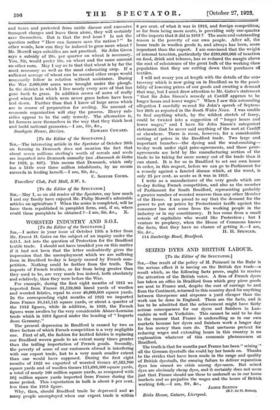SEIZED DYES AND BRITISH LABOUR.
[To the Editor of the SPECTATOR.] SIR,—One result of the policy of M. Poincare in the Ruhr is the serious effect it is having on the British dye trade—a result which, as the following facts prove, ought to receive the attention of the British voter. A firm of French dyers has taken an office in Bradford from which grey piece goods are sent to France and, despite the cost of carriage to and from the Continent, returned to this country dyed for anything between threepence and sixpence a yard cheaper than the work can be done in England. These are the facts, and it has to be admitted that the achievement might have fairly serious consequences for our dyers and finishers in Lan- cashire as well as Yorkshire. This cannot be said to be due to the rumour that France is underselling us in our own markets because her dyers and finishers work a longer day for less money than ours do. That unctuous pretext for reducing wages and extending hours in this country is no explanation whatever of this economic phenomenon at Bradford.
The truth is that for months past France has been " seizing ", all the German dyestuffs she could lay her hands on. Thanks to the strides that have been made in the range and quality of British dyestuffs, the ensuing failure to deliver reparation dyes has caused no crisis among dye-users. But seized dyes are obviously cheap dyes, and it certainly does not seem just that France should use these to undersell us in our home markets and so prejudice the wages and the hours of British working folk.—I am, Sir, &c.,
Birks House, Gatacre, Liverpool. JAMES SExTON
(M.P. for St. Helens%














































 Previous page
Previous page